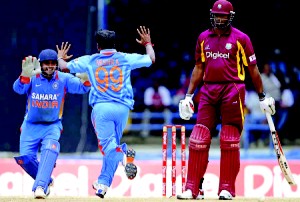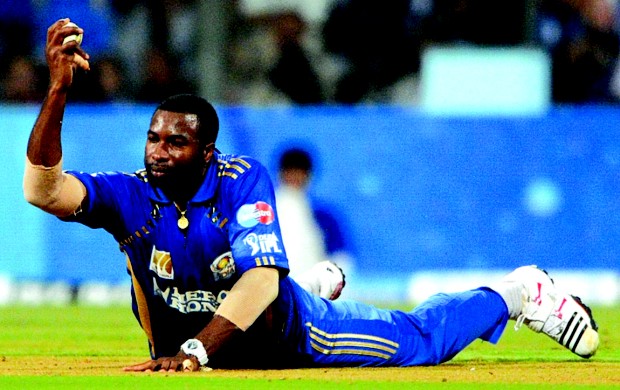| Home - Back Issues - The Team - Contact Us |
 |
| Volume 10 |Issue 23 | June 17, 2011 | |
|
|
Sport Pollard Resting on the Wobbly Bridge Mohammad Isam
Darren Sammy is not the West Indies captain by choice, neither his nor the selectors. He was the default choice when all else failed, and that is a long list of very talented and presentable cricketers. Not that Sammy is unworthy, but questions are regularly posed on his position of being a man, of say, Clive Lloyd's lineage. Sammy, for all his all-round value to West Indies, is a drop in the ocean of West Indies captains of the past Frank Worrell, Garry Sobers, Viv Richards and Lloyd. Sammy, the first Test cricketer from tiny St Lucia, was handed the leadership because nobody wanted to do anything to do with it. Shiv Chanderpaul and Ronnie Sarwan are spent forces while Chris Gayle and Dwayne Bravo went into loggerheads with the WICB [West Indies Cricket Board] a number of times, forcing those in power to use the only man to regularly claim a Test place as their leader. Those squabbles, over the last few years, have also led to the curious case of Kieron Pollard, the highly-talented all-rounder. Pollard also turned away from a regular contract with the WICB because the beefy lad from Trinidad realised that his cricketing talent lies somewhere else. Pollard went unnoticed when West Indies picked him in the 2007 World Cup after his blockbuster 83 in the Stanford Twenty20s the previous year and a debut first-class ton a few months later. But his arrival into international consciousness didn't come through the maroon of the West Indies but in the green and black of Trinidad and Tobago. He thrilled the Indian audience with some of the most brutal Twenty20 hitting ever seen in the country in the inaugural Champions League, an 18-ball 54 against New South Wales his signature knock. At once, Pollard became a Twenty20 commodity. South Australia came knocking and a few months later, he landed a $750,000 contract with Mumbai Indians, the Indian Premier League franchise. He provided a sting in the last few overs for the Sachin Tendulkar-led side, resulting in him being retained this year as well as finding a freelance role for Somerset in the English Twenty20 competition. In all three countries Australia, India and England Pollard has been a huge hit, but has since alienated himself from West Indies. Mainly through performance, Pollard is now a Twenty20 specialist.
For West Indies, he averages a meagre 20 from forty one-day games with three half-centuries. He has so far played 104 Twenty20 games across the globe and though he averages only above 25, he hits at a strike-rate of 160-plus as well as some fine work with his tidy seamers (average 20.76). Pollard rests on the uneasy bridge that divides the wider cricket world with the IPL breed. At once a superstar, a hot property, Pollard is also a struggling cricketer (as his recent form for West Indies has shown). It is a strange phenomenon but that is how the IPL has polarised cricket, not just inflated its coffers. Old-timers would sully Pollard for his ability to churn in money from what they call the 'little act'. If he was a footballer, the imposing West Indian would be making his living not from the European leagues but from six-a-side tournaments. Pollard's early days in cricket was going down the conventional lane until the IPL kicked in. A middle-order batsman who was as much willing to hit the sixes as he was ready to build innings from scratch, he was giving hope to West Indies supporters of a man who could turn around things for the fallen giants. But his career took a detour, as much by choice than chance. From an impoverished part of the world, he is born into responsibility and burdened with the insecurity. Pollard, like any other sportsman from developing countries, are forced to make the adjustment of playing more for the pocket than the heart. At the time, Twenty20 was new and no one could predict how it would hold up. Inevitably it swiftly became Pollard's pathway from rags to riches. He represented his country, his region, Mumbai Indians and South Australia where he joined the likes of Brett Lee, Shahid Afridi and Andrew Symonds for whom T20 had become the perfect spot. But there is one crucial difference between Pollard and these players. Most of these travellers are veterans enjoying an extra pay day and relishing the roars of the crowds. Pollard's Test and ODI credentials are modest, his abundance of promise has a spasmodic delivery. It is clear that Pollard's path is being swiftly ventured by youngsters across the globe. A 2010 survey by the world's premier cricketers' body found out that Australians, for instance, now target Twenty20 as much as they aspire to wear the Baggy Green. Indian cricketers too are totally hooked up on the IPL fix. Just like Pollard, they come from modest backgrounds with the hope to make the most of their talents. Paul Valthaty, one of the highest scorers in the IPL this year, didn't play a single first-class game all season but secured a trial with the Kings XI Punjab and made it count. There were several other cases who latched on to the Twenty20 gravy train and made their future secured. Swapnil Asnodkar made his name as fast as he is now a forgotten product of Twenty20. A resident of Goa, Asnodkar was given a chance by Shane Warne's Rajasthan Royals for whom he opened with a lot of fire. But that soon was doused by technical errors as well as a lack of longer-version experience. The Pollards will keep hitting cricket's shores for the next decade or so. While some point out that Twenty20's popularity is on the wane, it is somewhat unfounded as one looks at the English competition. These talented cricketers need a sense of security that only competitions like the IPL can provide so the gravy train will roll on, albeit slowly.
Copyright
(R) thedailystar.net 2011 |
||

